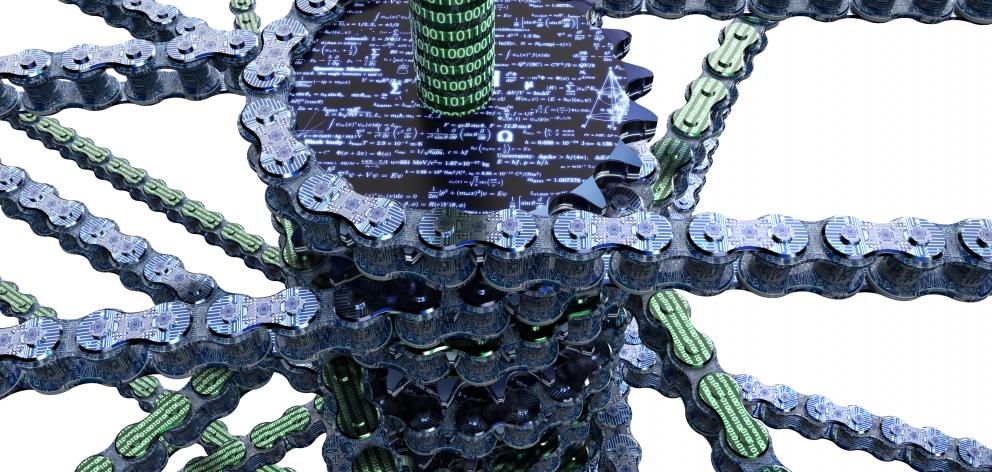
Many are concerned about the internet’s role in politics. But more worrying is the digital tsunami poised to engulf us as machine intelligence and a rising tech elite radically restructure life as we know it. Forget far-right populism; crypto-anarchists are the new masters, writes Jamie Bartlett.
Those who mistakenly thought 2016 was an anomaly, a series of unprecedented events, should have few remaining doubts. Marine Le Pen may have stuttered but still picked up almost 11 million votes. Her opponent, the ‘‘normal’’ candidate, was leader of a party only one year old. The ongoing terror attacks, fake news panic, Donald Trump’s tweets and James Comey: last year never really ended, it just carried straight on into this one.
After decades of exaggerated prediction, the internet is finally transforming politics, but not in the way the digital prophets expected. The ’90s, you may recall, were awash with optimism about our online future: limitless information and total connection would make us more informed, less bigoted and kinder citizens. But the internet is an overwhelming mess of competing facts, claims, blogs, data, propaganda, misinformation, investigative journalism, charts, different charts, commentary and reportage. It’s not the slow and careful politicians who have thrived in this busy environment, it’s the people with the shareable cut-through messages. Donald Trump might very well be the first truly social-media politician: his emotion-filled, simplistic blasts are perfect for the medium.
As a result, society is at present gripped by a curious consensus: that the internet has conspired with right-wing populists to sew up the future of politics. Noting the emergence of populist strongmen and demagogues who seem to be digital wizards like recovering Twitter addict Trump, and violent opponents who seem only to bolster their support, many are comparing — with a certain grim fascination — our current turbulence with the 1930s.
That is a very short-term view of things. The supremacy of the populist Right is not the inevitable future. The rise of the Right is better seen as an early skirmish in a much longer, and far more significant, technology-led restructuring of our politics and society. Digital technology has helped the populist Right for now, but it will soon swallow it up, along with many other political movements unable or unwilling to see how the world is changing.
Consider for a moment how your life has changed thanks to digital technology. You can become friends with 2 billion connected people, choose your own news and watch/date/order whatever you want, on demand. Infinite choice and control is now the norm, and yet formal politics has barely evolved since the days of Robert Peel. Our modern political system came of age in the Industrial Revolution, which was a time of massive organisations and centralised control. We are now, however, firmly in a new industrial revolution, characterised by endless choice, digital technology, data, automation and artificial intelligence. The economy, identity, political allegiances, perhaps even the essence of what it is to be human, are all starting to change, and our politics will have to change with it. The current setup, including the populist Right, will cling on for a while, like a legacy IT system that’s too pricey to update, but it will shortly become redundant.
So what else might follow?
In October last year, while researching my new book, Radicals, I was invited by a Slovenian hacker in his late 20s called Pavol to a place called Parallel Polis, a three-storey building in Prague that includes a 3-D printer workshop and the "Institute of Crypto-Anarchy".

Crypto-anarchists are mostly computer-hacking, anti-state libertarians who have been kicking around the political fringes for two decades, trying to warn a mostly uninterested public about the dangers of a world where everything is connected and online. They also believe that digital technology, provided citizens are able to use encryption themselves, is the route to a stateless paradise, since it undermines government’s ability to monitor, control and tax its people.
Crypto-anarchists build software — think of it as political computer code — that can protect us online. Julian Assange is a crypto-anarchist (before WikiLeaks he was an active member of the movement’s most important mailing list), and so perhaps is Edward Snowden. Once the obsessive and nerdy kids in school, they are now the ones who fix your ransomware blunder or start up unicorn tech firms. They are the sort of people who run the technology that runs the world.
Parallel Polis was putting on something called the Hackers Congress: a three-day gathering for Europe’s collection of crypto-anarchists, bitcoin enthusiasts, libertarians and hackers. The theme was "Decentralised".
"The concept of authoritative state is gradually becoming obsolete," reads the programme.
"The rise of sharing economies with reputation models, digital contracts and cryptocurrencies makes the role of central governments useless."
The congress was designed to work out how to speed up its demise.
When I arrived early on Saturday morning, the whole place was teeming with (mostly) men in their 20s or early 30s speaking in competent Atlantic English. The 3-D printer whirred in the background, postcards of the elusive creator of bitcoin, Satoshi Nakamoto, were being sold, and eyes stared at lines of the incomprehensible language of computers: Java, Ruby, C++. At events and clusters, groups of these future-dwellers complained about inefficiency as if it were a cardinal sin; discussed "how to build a stateless world"; praised Edward Snowden; laughed about crap government IT; weighed up the latest anonymous and secure messaging apps; and talked excitedly about bitcoin and something called ‘‘blockchain’’. Frank and Smuggler — two German crypto-anarchists — wore facemasks all weekend, because they were worried about facial recognition technology.

I hadn’t eaten since I left London, so the first thing I did on arrival was join the queue for food and coffee. But my Czech currency, koruna, which I had dutifully exchanged at the airport at near criminal rates, was not accepted.
"We only take bitcoin," said the assistant.
Parallel Polis is the one place in the world that accepts only bitcoin.
In case you don’t know yet, bitcoin is a digital currency. It is secure, pseudonymous and fast, with no central authority controlling value or supply. It’s a currency that operates independently of government, and can’t easily be traced back to individuals or taxed. At Polis the staff are paid in bitcoin; rent collected for their co-working space is paid in bitcoin, too. I got a little plastic card with a QR code, and transferred bitcoin on to it using one of the three specialised ATM machines. From that point on, every time I wanted anything I scanned the QR code. Ping! A coffee. Ping! A Red Bull. Ping! Some goulash. Ping! A postcard of Edward Snowden. I didn’t use koruna once.
Given a bitcoin was worth around £300 back then, and is now trading at close to £2000, my cup of coffee cost approximately £25 in today’s money. Some of the staff have probably now retired.
A few years ago, crypto-anarchists like these were the only people using bitcoin. Even though it’s now used by millions of people, and accepted at a growing number of businesses as a legitimate form of money, it was originally designed by a crypto-anarchist as a neat way of undermining central banks’ control over the money supply. It is a revolutionary idea wrapped up as efficiency gain. Bitcoin is more than a currency, it’s a new way of handling information. It uses blockchain, which is a technique to create a massive, distributed, tamper-proof database that anyone can add to but no-one can delete, because no-one controls it. Millions of pounds of investment are pouring into bitcoin and blockchain from governments, banks, IT and financial services, all excitedly eyeing up a novel way to store information or prove asset ownership securely. Specialists reckon it’s as revolutionary as the internet itself.
Crypto-anarchy is taking over the world, since millions now unwittingly rely on it for online security, and more are scrambling after blockchain and bitcoin ideas, desperate not to be left behind. At Parallel Polis the idea of wholesale adoption of crypto-anarchism by society is met with shrugged shoulders and obviously-they-have smirks. That governments, businesses and friendly liberal types are falling over themselves to import exciting new tech that has been explicitly designed to undermine them is a bit of an inside joke. Most of us chase their latest shiny toys and have no real understanding of what we’re doing.
The rise of crypto-anarchism might be good news for individual users — and there are plenty working on ways of using this technology for decent social purposes — but it’s also bad news for governments. It’s not a direct path, but digital technology tends to empower the individual at the expense of the state. Police forces complain they can’t keep up with new forms of online crime, partly because of the spread of freely available encryption tools. Information of all types — secrets, copyright, creative content, illegal images — is becoming increasingly difficult to contain and control. The rash of ransomware is certainly going to get worse, exposing the fragility of our always connected systems. (It’s easily available to buy on the dark net, a network of hidden websites that are difficult to censor and accessed with an anonymous web browser.)
Who knows where this might end. A representative from something called "Bitnation" explained to Parallel Polis how an entire nation could one day be provided online via an uncontrollable, uncensorable digital network where groups of citizens could club together to privately commission public services. Bitnation’s founder, Susanne Tarkowski Tempelhof, hopes Bitnation could one day replace the nation state and rid us of bureaucrats, creating "a world of a million competing digital nations", as she later told me.
And that is just the tip of the iceberg. As the theme of the congress suggests, digital technology, like bitcoin, is a disruptive force of decentralisation. It tears down settled hierarchical organisations and builds new networked ones (although, like Facebook, they can sometimes end up becoming very centralised too). Social media is "many to many" communication, rather than "one to many" broadcast.
"Sharing economy" companies such as Uber and Airbnb are all about linking people and assets via smartphones. Even the internet itself is designed to be distributed, borderless and difficult to control.
That decentralising force is sweeping through society and economies and the effects are difficult to predict. The most fun to be had at Parallel Polis was guessing which industries would be "Ubered" next: that is, transformed into a peer-to-peer industry conducted on an app. Several companies are already monetising unused assets: borrowing cars (RelayRides), daily tasks (TaskRabbit), lending bikes (Liquid), lending money (Lending Club), home Wi-Fi (Fon) and even clothes (Neighborgoods). The conclusion at Parallel Polis — and indeed in Silicon Valley — is that any industry that takes a cut of a deal between two people or holds fixed assets that can be provided informally will be soon "Ubered", because smartphones link buyers and sellers directly. Personally, I think estate agents might be next.
These so-called sharing economy companies proudly disrupt entire industries in the name of efficiency. Politics is struggling to keep up, and regulators aren’t always sure what rules apply to them. Uber, the largest taxi firm in the world without owning any taxis, runs a gig-economy comprising temporary, zero-hour employees.
It works well for consumers and some drivers, but the cost of flexibility is job security and legal rights, in addition to squeezing existing industries such as existing taxi companies. The gig economy could one day cost government treasuries a small fortune in tax.
Spending time in Parallel Polis is like peering into the not-too-distant future and seeing the approaching disruption. Shortly after I emerged from the Tardis, I watched Donald Trump get elected with tweets about borders and coal mines and reopened factories. He tapped into legitimate worries that many felt and feel, and correctly fingered the stagnating wages of middle America (in part a result of technological changes). But it all felt somehow marginal, a sticking plaster for what’s coming. Most people at Parallel Polis thought the US election was a bit of an irrelevance.
Even in the short time since Trump’s victory, an even bigger technology challenge has loomed into view: artificial intelligence. Forget angry marching robots or some absurd "singularity", whereby computers become sentient. The AI revolution is taking the boring form of machine-learning algorithms, which essentially means giving a machine lots of examples from which it learns what to do. Give it enough data and it can start doing things better, and faster, than humans. And because machine learning relies on data to improve, there is a powerful feedback loop: more data fed in makes it smarter, which allows it to get more data, which makes it smarter, which ...
In the past couple of years we’ve entered this self-perpetuating loop. Brace yourself for a run of stories about machines doing jobs better than unreliable, break-taking, tardy Homo sapiens. Already this year software has trounced humans at fruit-picking, bricklaying and burger-flipping. That you’re probably not surprised by this remarkable feat shows how far we’ve come. It will very shortly move on to less routine and even very skilled work that takes years for a human to master. Already, machine-learning software can outperform the top doctors at diagnosing illness from CT scans, by running through millions of correct and thousands of incorrect examples real live doctors have produced over the years.
Whether this machine-learning revolution means fewer jobs, more jobs, worse jobs or different jobs is hard to predict. More jobs in the short term and fewer in the long term seems most likely: according to the Bank of England, as many as 15 million British jobs might disappear from the twin forces of AI and automation within a generation.
At the very least it will mean disruption for people and some entire industries, twinned with sudden shifts in labour and skills needs. Take trucking in the US, which is the biggest employer in 10 states, responsible for 3.5million jobs. It may be a mostly job-free industry within a decade. Things will still be shifted around in containers, of course, but it’ll all be run by yet another software firm that rents human-free cabs. And with that, there will be no need for truck stops either, or the highway patrol, or the companies that make parts for radar guns, and so on and on.
If large numbers of the tax-paying classes disappear or are reduced to precarious freelancers, what happens? The techno-optimist — the one that bounced around the Parallel Polis echo-chamber — says we’ll create new jobs, free people from the drudgery of dull work and all arc towards progress and freedom. The stock solution will doubtless be for the hapless to retrain for better, more creative, more meaningful jobs, putting aside the dubious evidence for whether that actually works: retrain for what, exactly? The best we appear capable of at the moment is software programming and coding. But coding will probably be one of the first jobs to be automated out of existence, leaving the newly trained feeling like Minidisc specialists circa 2005: the exciting new future washed away before it could settle in.
No-one in Prague or Silicon Valley or Shoreditch or anywhere else is willing or able to put the brakes on, which is why Parallel Polis people were excitedly discussing the "universal basic income", essentially a way to pay economically useless people to live, consume and keep capitalism ticking over. Perhaps that will work — it is seriously worth debating — and perhaps new jobs will arrive too. But also possible is a dystopia in which millions of economically valueless citizens scratch out an existence as a client class while a small number of tech mega-monopolies and crypto-anarchist geniuses rack up unprecedented wealth and influence. No-one really knows where this ends up.

At present, technology stands outside the messy business of politics, but in a couple of elections’ time, AI, big tech, the sharing economy, will be discussed as angrily as immigration or the National Health Service now. Does anyone seriously believe that Jeremy Corbyn or Theresa May or Nicola Sturgeon has the foggiest clue about any of this, and what to do about it? (I’ve not even mentioned climate change, synthetic biology, the continued mass movement of people, billions of connected internet-enabled devices.) To most politicians — even the Left, which once imagined that its "white heat" would forge a better world — technology is mainly viewed as a job creator or deliverer of efficiency. The phrase "centre of innovation" is the digital equivalent of motherhood and apple pie: no right-minded politician could ever oppose it. True, things are slowly changing and there’s more about digital technology in this round of manifestos than ever before: the Conservatives promise a digital charter, the Lib Dems mention artificial intelligence, and Jeremy Corbyn launched a special "digital manifesto" last year. Maybe I’m expecting too much, and maybe citizens don’t care enough either. But none of this yet amounts to a vision that matches the scale of what’s going on.
And what of the populist Right, with its focus on culture, borders, immigration and sticking it to the establishment? When asked about the future of artificial intelligence and automation, US treasury secretary Steven Mnuchin replied: ‘‘It’s not even on our radar screen’’ and that he’s "not worried at all". A few weeks ago, his boss climbed into a huge rig wearing an "I love trucks" badge, just as nearly everyone in Silicon Valley agreed that artificial intelligence was about to decimate the industry. Trump might be able to stop the immigrants or slow outsourcing for a while, but who will stop the robots and the smiling data scientist? The little Trumps: Le Pen, Nigel Farage, Geert Wilders etc. aren’t much better. Their concern with burqas and bankers means technology, the real driving force in society, isn’t in their sights.
The politics of right-wing populism won’t go without a colossal struggle, of course, because it is, in part at least, a reaction to changes digital technology has already wrought. In the short term it might even strengthen: if the walls don’t keep people out, promises aren’t kept, wages stagnate, jobs don’t reappear, taxes don’t get raised, then disappointment fuels disillusion and we enter a spiral of ever-deepening radicalism. But the collapse of the centre ground of politics, into which noisy populists have barged, is also creating room for others: French leftist politician Jean-Luc Melenchon (and his deliciously pointless 100% income tax rate on top earners), Bernie Sanders, Podemos, Occupy, the Women’s Equality party. In Italy, comedian Beppe Grillo’s internet-based Five Star Movement defies placement on the left-right political spectrum, and has been leading in Italian polls.
Things are opening up in politics. So perhaps a better comparison than the 1930s for our age is the 1820s. That period witnessed what must have felt at the time like unprecedented change and confusion: the onset of industrialisation, political revolution and counter-revolution, great leaps in science, and the first railways. A British prime minister was assassinated. Luddites smashed machines, fearing that the power loom — that generation’s artificial intelligence — would cause mass unemployment. But the turmoil and instability of the last industrial revolution did not thrust us inexorably into the arms of tyrants. It did, however, shake up old assumptions as never before, stimulating a flowering of ideas, some of which were stirrings of the modern world: working-class consciousness, extended (albeit still limited) suffrage, Factory Acts, socialist theory, Catholic emancipation and utilitarianism.
At some point, and probably sooner than we think, the current left and right offerings of the major parties, including (perhaps especially) the populist, will start to appear ludicrous and unworkable. Before long, new political movements and ideas will arrive for this industrial revolution, especially once the majority of the population will soon have grown up online. It will be a politics that offers solutions to the challenges society will face and be bold enough to steer technology rather than be led by it, to harness it rather than dismiss it, to see it as a motor of social change, not just a job maker. Perhaps there will be some back-to-the-earth, off-grid thinking reminiscent of the 1970s. (There are already small hints of it if you look in the right places: bricks through Google bus windows and digital detox days.)
I’m not sure. More likely is that groups like the Prague crypto-anarchists, who will embrace the changes and experiment with entirely new forms of governance and society, will emerge. After all, they were right about digital technology, about surveillance and bitcoin and most of us ignored them. And for better or worse, I think they’re probably right about this too.
— Guardian News and Media











